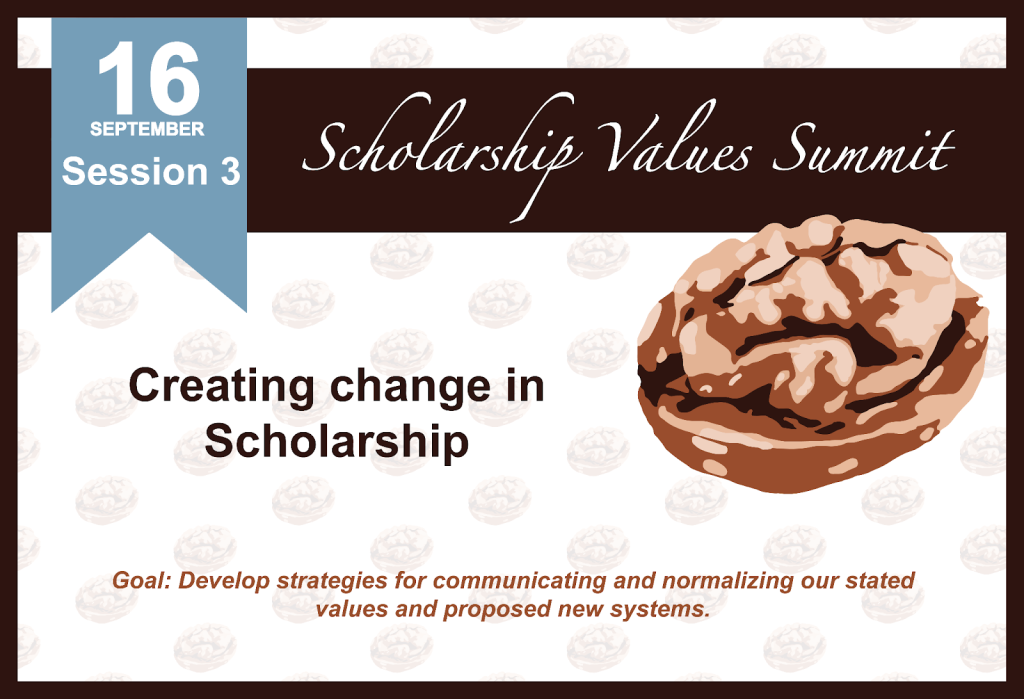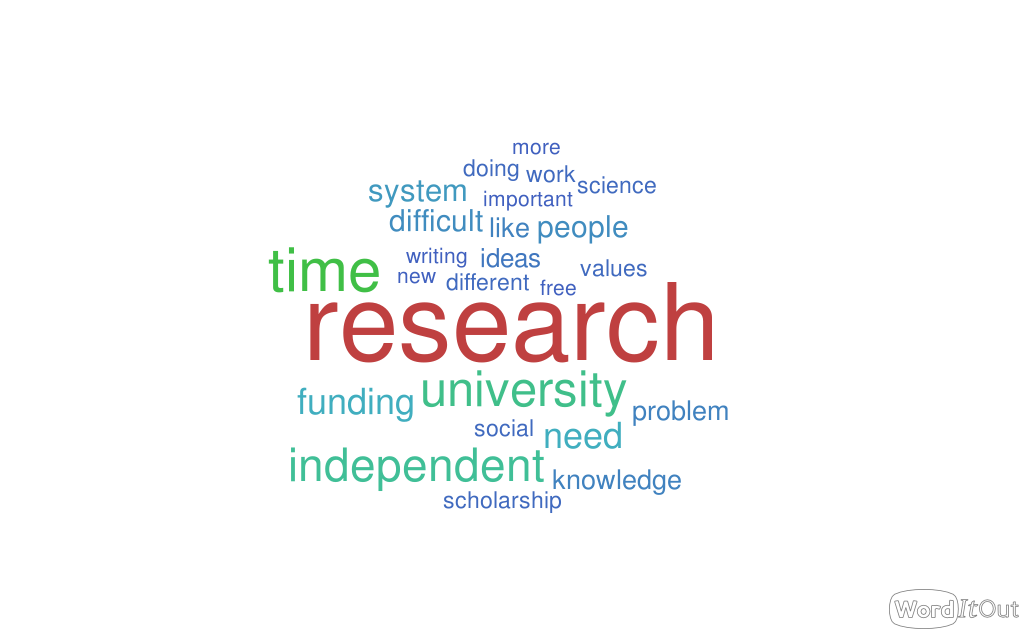Scholarship Values Summit 2021
Part 1 | Part 2 | Part 3
Barriers to academic reform are often more cultural than technical, and highlight the need for a sustained movement for change. To conclude the Scholarship Values Summit 2021–an unconference that was co-hosted by the Ronin Institute and IGDORE–participants discussed the necessary cultural change to realize the scholarly values we discussed in the preceding sessions (see Part One and Part Two of this three-part blog series). In this post (cross-posted on IGDORE’s Medium), we provide a summary of both practical actions and broader initiatives that scholars can use to enact systemic change.
We summarize the themes that emerged from the breakout table discussions held in “Session 3: Creating change in Scholarship” on September 16, 2021. The summaries were put together by authors of this post, and are based on real-time note-taking from participants during the sessions. They reflect additional contextualization by the authors, and some sections are the synthesis and distillation of more than one table discussion. Therefore, the summaries are not fully comprehensive of what was discussed in the session, and they go beyond the views of the authors.
Acknowledgements: We would like to acknowledge the contributions of participants at Session 3 of the Scholarship Values Summit 2021, and particularly the leads of breakout tables and individuals who contributed to the shared notes to help summarize discussions.

Make time for independent research
How do we secure the time needed for our research (e.g., writing, reading, analyzing, etc.), while also striking a balance with our other commitments such as supporting our family and engaging in the social and personal aspects of our lives, not to mention global issues humanity is facing as a whole? With a full-time job, it is very difficult to do it all. Such a balance is generally more difficult for women than men, because women often have increased responsibilities in the home and with child care.
One solution is to look for a part-time job for income, and dedicate part-time to research. The transition to remote work has helped to make these models even more appropriate for independent scholars, because paid work can be done more efficiently and conveniently, leaving more time and energy for scholarship. It is difficult and time-consuming to gain access to research funding, so “self-funding” your own research might be a good trade off. There are full time jobs for research, but that can also lead to becoming committed to research that we don’t feel passionate about, and be so time-consuming that our personal life suffers. So there are advantages for not being paid directly for research. Alternatively, scholarship can be practiced by those who are in stages of their life when there are less responsibilities (early career) or less financial concerns, such when one is approaching retirement and receiving a stipend or pension.
How do we secure the time needed for our research …while also striking a balance with our other commitments such as supporting our family and engaging in the social and personal aspects of our lives..?
For those who have full time jobs (or some equivalent), scholarship can be done in time outside regular working hours. But research can be demanding and it may be difficult to find a sustainable balance between both activities. Scholars must also self-validate their work as being something that matters–something that they are passionate about–so they stay motivated to write, read, and communicate that enthusiasm. At the same time, it should be recognized that even in the best case, jobs that allow this balance are more easily accessible to scholars with privilege, and systemic changes in how income is delivered is required. Sharing amongst scholars about approaches to carving out time for research when we have a full time job or other responsibilities can help others figure this out.
Get creative with funding
Funding research is one of the biggest challenges that unaffiliated scholars have. Foundations and national funding in many jurisdictions, including the United States and the European Union, mostly fund projects at research institutes and rarely individuals; foundations aren’t often willing to interact with people they don’t know. Starting a nonprofit as an “institute” is not an easy path either, since an institute must build up a financial history to be seen as a credible administrator of research funding. The career stage of an independent scholar also impacts success. For example, funding possibilities for early career scholars (e.g., before receiving a Masters degree or higher) is limited, and a lack of history and experience gaining funding makes it difficult to be competitive.
At the economic and social policy level, to facilitate systemic change, a universal basic income could help scholars to explore a wider range of areas beyond dominant expectations of what research is considered feasible or valuable.
Scholars can take the approach of separating their research from their need for income. Research adjacent work is available. For example, ministries and administration (i.e. public policy bodies) need researchers who avoid jargon and can answer their questions. Reviewing patents related to one’s research field is another common way to earn income, and being fluent in relevant jargon actually comes in handy. The rapidly developing field of citizen science also offers lots of opportunities to engage in research without the need to engage in academia. This route may be particularly attractive to youth who are considering research as a career option, or for people who are working in a job that does not involve research.
There may also be a place for additional philanthropy in supporting independent research. One example of a workable model is the National System of Art Creators based in Mexico. This competitive fund provides 3 years of salary, which is often all that many scholars, especially those in humanities or in more theoretical domains, need to support their work. At the economic and social policy level, to facilitate systemic change, a universal basic income could help scholars to explore a wider range of areas beyond dominant expectations of what research is considered feasible or valuable.
Reflect on research questions
What should researchers work on? This is a value-laden question that can receive very different answers depending on who you ask! Some people promote following your curiosity or looking for grand challenges or gaps within a field of knowledge. Others suggest more goal-oriented approaches such as use-inspired basic research, becoming more attuned to the problems that need solving, or community consultation to find problems that society wants to be addressed. As researchers are rarely short of projects to work on, providing guidelines could be a useful way to assess what is most important to work on.
independent researchers and other non-traditional academics may be in a good position to work on topics that researchers at universities typically neglect.
Unfortunately, problems that many researchers agree are important are usually not easy to solve. Yet, academic incentives are currently not well aligned to promote work on such questions: there is little tolerance for failure (so even projects defined as ‘high-risk’ nearly always succeed), while the administrative burdens placed on researchers by their host institution increase as they gain skills and experience. Indeed, independent researchers and other non-traditional academics may be in a good position to work on topics that researchers at universities typically neglect. Progress in deciding what problems researchers should work on must be accompanied by ways to enable them to do so.
Reclaim scholarly communication
Commercial publishers are criticized as having too much control over scholarly communication channels. Although initially resistant, corporate publishers have recently begun to embrace open-access and open-science, but largely as a way to co-opt and control it. Increasingly monopolistic and aggressive in their dealings with university libraries, publishers’ business models rely on the free labor of scholars and their need to publish in “prestigious” journals to advance their careers.
One approach noted by participants is to create new infrastructure, owned by scholars, professional societies, or other public institutions with an organizational form (such as a co-operative or public-benefit “B” corporation) that can’t be sold off to commercial interests such as publishing conglomerates. It is important to note, however, that many learned societies have arranged themselves with the current system such that they actively resist changes towards new models of engaging in, sharing or assessing scholarship. The development of an ecosystem of preprint servers (led by arXiv, and it’s descendents) was an important step, owned largely by universities or non-profits.
Beyond this, there are even newer projects continuing in this direction, including ScholarLed (a consortium of open-access presses), and ResearchersOne (a low-cost publication platform that allows the creation of “overlay journals”), or Research Ideas and Outcomes (a low-cost platform for publishing research across all steps of the research cycle). The time is also ripe to explore scholarly platforms like JOGL (Just One Giant Lab) that are being reconceived as a “platform co-operative”, which have gained traction in the “gig-economy” as a way for workers to own the platform. There are also technical approaches such as Everipedia (a ‘blockchain Wikipedia’) that could potentially act as substrates for these efforts.
corporate publishers have recently begun to embrace open-access and open-science… largely as a way to co-opt and control it… publishers’ business models rely on the free labor of scholars and their need to publish in “prestigious” journals to advance their careers.
Some participants noted that some of these approaches currently have little market share, and may not easily scale. They emphasized that scholars need a system that would attract the same kind of attention and develop the appeal that the big publishers currently have, but be controlled by scholars and scientists – to beat the commercial publishers at their own (prestige) game. Once such a platform was established, the goal of the game could change to reduce the focus on prestige, and emphasize other values such as reproducibility, equity and sustainability. A related approach is to work from the other end – take a commercial publishing entity and “exit to community” – converting it from an organization owned by investors and shareholders, to one owned by the community. (A high-profile example of this was the 2017 “Buy Twitter” campaign). Indeed, the 450 movement encourages scholars to stop doing reviews for free for for-profit journals.
These approaches could be pursued in parallel: bottom-up experiments in new organizational forms and low-cost, decentralized architecture; while working on converting commercial publishers to a community-ownership, or otherwise supplanting them, in a more large-scale, top-down way.
Embrace more transparent reviews
A better review system might encourage discussions between an article’s authors and a wider community of readers than the current peer review system can facilitate, all of which could lead to improvement of the research outputs, particularly if work is shared while “in-progress” rather than just in its final state.
Re-imagining the peer review process has become the frontier of publishing reforms. One complaint about ‘review as usual’ is that many journals do not publish reviewer reports (although there are exceptions), which can be an important part of the scientific discourse. Furthermore, although a reviewers’ report can provide detailed feedback, the standard recommendation from any review remains a binary outcome – reject or accept (with revisions). A better review system might encourage (and document) discussions between an article’s authors and a wider community of readers than the current peer review system can facilitate, all of which could lead to improvement of the research outputs, particularly if work is shared while “in-progress” rather than just in its final state.
The open publication of peer review reports and increasing formal opportunities for post-publication peer review and commentary are progress in this direction. Further, discussions about papers in journal clubs and social media are allowing informal peer assessments to be integrated into the scientific discourse. Other examples of community knowledge sharing and evaluation platforms exist, such as the StackExchange ecosystem (which makes content available under Creative Commons licenses) or Quora, and it is possible to imagine a similarly decentralized system for open reviewing that facilitates social feedback and may even use artificial intelligence systems to curate knowledge.
Another consideration is that the current system of peer-review often makes the funding and publication of non-mainstream ideas difficult. While preventing non-scientific findings from entering the academic discourse can be important, many groundbreaking ideas are rejected when they are first proposed. Ideally we would like a system that initially errs on making such reports accessible for the scholarly community to provide feedback on, regardless of whether or not they stand up to critical review later on. Another issue to consider is how to gather reliable data, either during the publication process or elsewhere, that could reveal the degree to which academic knowledge depends on labor from those in precarious positions. Overall, there is substantial scope, and need, for increased transparency in the evaluation of academic knowledge.
One approach to solve collective action problems is via collective “pledges”…individuals pledge to take an action, but that action would only be taken when a critical mass of individuals is reached. With critical mass, the action is more likely to be more successful…
Turn pledges into a movement
Changing academia’s long-entrenched institutional culture is ultimately a collective action problem. Individuals are often penalized for doing “the right thing” (for example, publishing in a less prestigious journal that is open-access with a low article-processing charge, versus in a closed-access high-prestige journal), even when it is clear that the entire community would benefit from a collective shift in the right direction. One approach to solve collective action problems is via collective “pledges”. In this model, individuals pledge to take an action, but that action would only be taken when a critical mass of individuals is reached. With critical mass, the action is more likely to be more successful, and more people may be willing to commit to the action, knowing that they would not be alone in taking a step that might be individually risky. Free Our Knowledge is such a platform for creating pledges: individuals commit to an action when a threshold of people make a pledge.
Pledges could be a potential mechanism for revealing otherwise invisible systemic inequities in academic and publishing institutions. For example, some universities exploit unpaid affiliates, such as self-funded graduate students, by requiring them to list the university as their primary (and in some cases, only) affiliation on research papers, despite not paying them to do that research. One pledge might be to withdraw their university affiliation on research outputs if the university doesn’t provide them with meaningful support or allow them to list other affiliations they have. Another potential pledge, which extends on the existing Open Access pledges provided by Free Our Knowledge, is to collectively agree to withhold labor from large corporate publishing conglomerates (by refusing peer-reviewing or editorial work) unless paid directly, or otherwise contracted, for that work.
Rethink the university
Many scholars have moved out of academic employment but still miss aspects of working at a university, particularly the serendipitous social interactions that occur during coffee breaks with their colleagues! Can we build new types of institutions that provide what scholars not affiliated with a traditional university need and want? Starting from our shared values, we could develop a vision of a ‘university of the future’ and articulate what it is trying to address. Indeed, our culture and approaches in academia have often only been representative of one perspective (WEIRD), which limits our ability to be open to other ways of doing things, including developing a new academia. We ask: How can we bring our full cultural diversity (from non-westernized and underrepresented cultures) to the table for a new academia? For example, 80% of biodiversity is overseen by indigenous peoples, but how many indigenous universities do we have? What would a university that is based on indigenous knowledge generation look like? Due to our cultural conditioning, it’s difficult to even think differently. Overall, we need to genuinely meet indigenous cultures & science, not just “integrate it” into the dominant “westernized” scientific mindset.
our culture and approaches in academia have often only been representative of one perspective… which limits our ability to be open to other ways of doing things… How can we bring our full cultural diversity (from non-westernized and underrepresented cultures) to the table for a new academia?
One means to establish different forms of organizing the university beyond traditional hierarchical forms and mindsets might be to establish and develop robust communities of practice (CoP). CoPs are intended to bring groups of practitioners together to work on common problems and practice solutions. They are important for being able to develop new ideas, gain different perspectives, and examine the root causes of our challenges. By connecting values, practice, and community, CoPs can help support and sustain changes in university structures and scholarship more broadly. To start exploring such fundamental questions about the way that scholarship operates, we need to get the right mixture of diverse people together. Oftentimes, scholars only meet at the start and ends of a project, when seeking funding and publishing the results. Yet, the important part is in the middle, how the research itself was performed.
Founding new institutions poses many administrative challenges that vary by jurisdiction and the legal classification of the organization (such as college vs. university and public vs. private). Indeed, a balance may need to be found between experimenting with new institutional models and remaining similar enough to existing universities such that it is still generally recognized as one. Allowing for flexibility and creativity in space, time, and participation for everybody involved is now an important factor to consider in institutional design. Regardless of whether scholars start a new university, the time seems to be ripe for innovation in both higher education and education more generally.

This post is a perspective of the author, and does not necessarily reflect the views of the Ronin Institute.




Pingback:What are harmful systems in scholarship? – Ronin Institute
Pingback:Our shared values as scholars – Ronin Institute
The Ronin Institute should be commended for hosting the Scholarship Values Summit 2021 and publishing this comprehensive discussion of topics that are uncomfortable to academic researchers. I’m hoping this work gets broadcast widely, so young researchers can see the role they can play as change agents in manifesting an inclusive future science. As for-profit predatory and semi-predatory journals are flourishing in response to the need of academics to publish copiously and rapidly, we are simultaneously seeing an an erosion of rigorous peer review serve to maintain the norms of scientific collaboration, appropriate attribution, and research excellence. It is time for a thoughtful reset, and I applaud the work of the authors.
Thanks, Rusty. I agree, it’s important to be able to discuss these issues. Many researchers are aware of many (if not most) of these issues, but often in a peripheral way. I think that’s partially because the publish-or-perish, run twice-as-fast-to-stay-in-the-same-place culture itself doesn’t allow much time to engage in these issues too deeply. It’s easier to hope that someone else: funding bodies, or institutions will fix the issues. There’s a bit of an inertia at work: people wait for institutional change, but institutions respond only if there is a groundswell towards change, We need to break the cycle.